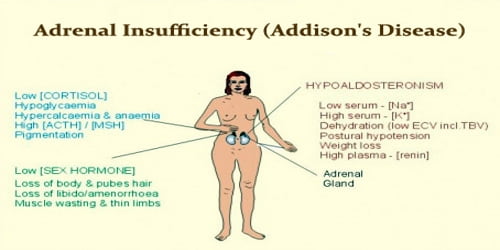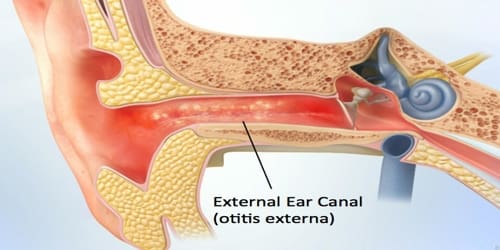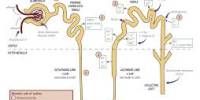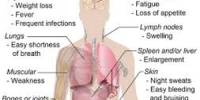Adrenal Insufficiency
Definition: Adrenal Insufficiency (Addison’s Disease) is a disorder that occurs when our body produces insufficient amounts of certain hormones produced by our adrenal glands. In Addison’s disease, our adrenal glands produce too little cortisol and often insufficient levels of aldosterone as well.
Adrenal Insufficiency or Addison’s Disease occurs when the adrenal glands do not produce enough of the hormone cortisol and in some cases, the hormone aldosterone. For this reason, the disease is sometimes called chronic adrenal insufficiency, or hypocortisolism.
The disease is characterized by weight loss, muscle weakness, fatigue, low blood pressure, and sometimes darkening of the skin in both exposed and non-exposed parts of the body.
Treatment for Addison’s disease involves taking hormones to replace the insufficient amounts being made by our adrenal glands, in order to mimic the beneficial effects produced by our naturally made hormones.
Cortisol is normally produced by the adrenal glands, located just above the kidneys. It belongs to a class of hormones called glucocorticoids, which affect almost every organ and tissue in the body. Cortisol’s most important job is to help the body respond to stress. Among its other vital tasks, cortisol:
- helps maintain blood pressure and cardiovascular function;
- helps slow the immune systems inflammatory response;
- helps balance the effects of insulin in breaking down sugar for energy; and
- helps regulate the metabolism of proteins, carbohydrates, and fats.
Aldosterone keeps the sodium and potassium in our blood balanced, which helps control our blood pressure and the balance of fluids in our body.
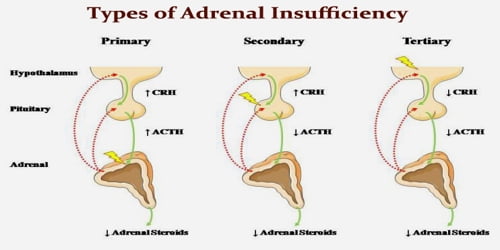
Causes and Types of Adrenal Insufficiency: Causes of acute adrenal insufficiency are mainly sudden withdrawal of long-term corticosteroid therapy, Waterhouse-Friderichsen syndrome, and stress in people with underlying chronic adrenal insufficiency. The latter is termed critical illness-related corticosteroid insufficiency.
Failure to produce adequate levels of cortisol, or adrenal insufficiency, can occur for different reasons. The problem may be due to a disorder of the adrenal glands themselves (primary adrenal insufficiency) or to inadequate secretion of ACTH by the pituitary gland (secondary adrenal insufficiency).
Causes of adrenal insufficiency can be categorized by the mechanism through which they cause the adrenal glands to produce insufficient cortisol. These are adrenal dysgenesis (the gland has not formed adequately during development), impaired steroidogenesis (the gland is present but is biochemically unable to produce cortisol) or adrenal destruction (disease processes leading to glandular damage)
There are three major types of adrenal insufficiency.
Primary Adrenal Insufficiency – Primary adrenal insufficiency is also called Addison’s disease. It is due to impairment of the adrenal glands. When people have this type, their adrenal glands are damaged and can’t make the cortisol they need. They also might not make enough aldosterone.
Other causes of adrenal gland failure may include:
- Tuberculosis
- Other infections of the adrenal glands
- Spread of cancer to the adrenal glands
- Bleeding into the adrenal glands, which may present as an adrenal crisis without any preceding symptoms.
Secondary adrenal insufficiency – This form of Addisons disease can be traced to a lack of ACTH, which causes a drop in the adrenal glands production of cortisol but not aldosterone. A temporary form of secondary adrenal insufficiency may occur when a person who has been receiving a glucocorticoid hormone such as prednisone for a long time abruptly stops or interrupts taking the medication.
Another more common cause of secondary adrenal insufficiency occurs when people who take corticosteroids for treatment of chronic conditions, such as asthma or arthritis, abruptly stop taking the corticosteroids.
Tertiary adrenal insufficiency is due to hypothalamic disease and a decrease in the release of corticotropin-releasing hormone (CRH). Causes can include brain tumors and sudden withdrawal from long-term exogenous steroid use (which is the most common cause overall).
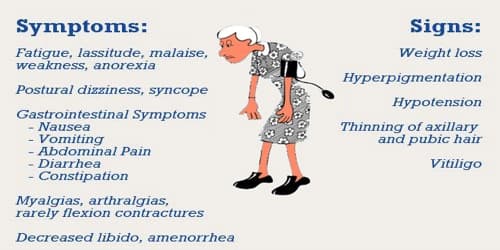
Signs and Symptoms of Adrenal Insufficiency: The adrenal glands, located above the kidneys, secrete many hormones essential for the body’s normal functions. People with adrenal insufficiency do not produce enough of two vital hormones, called cortisol and aldosterone. The symptoms of adrenal insufficiency usually begin gradually.
Adrenal Insufficiency (Addison’s disease) symptoms usually develop slowly, often over several months, and may include:
- Extreme fatigue
- Weight loss and decreased appetite
- Darkening of your skin (hyperpigmentation)
- Low blood pressure, even fainting
- Salt craving
- Low blood sugar (hypoglycemia)
- Nausea, diarrhea or vomiting
- Abdominal pain
- Muscle or joint pains
- Irritability
- Depression
- Body hair loss or sexual dysfunction in women
Symptoms of an addisonian crisis include sudden penetrating pain in the lower back, abdomen, or legs; severe vomiting and diarrhea, followed by dehydration; low blood pressure; and loss of consciousness. Left untreated, an addisonian crisis can be fatal.

Diagnosis and Treatment of Adrenal Insufficiency: Adrenal insufficiency can be difficult to diagnose. Tests that measure the levels of cortisol and aldosterone are used to make a definite diagnosis and include the following:
- ACTH Stimulation Test: This is the most specific test for diagnosing adrenal insufficiency. Blood cortisol levels are measured before and after a synthetic form of adrenocorticotrophic hormone (ACTH), a hormone secreted from the anterior pituitary is given by injection.
- Insulin-Induced Hypoglycemia Test: A reliable test to determine how the hypothalamus and pituitary and adrenal glands respond to stress is the insulin-induced hypoglycemia test. In this test, blood is drawn to measure the blood glucose and cortisol levels, followed by an injection of fast-acting insulin. Blood glucose and cortisol levels are measured again at 30, 45, and 90 minutes after the insulin injection. The normal response is for blood glucose levels to fall and cortisol levels to rise.
Once a diagnosis of primary adrenal insufficiency has been made, x-ray exams of the abdomen may be taken to see if the adrenals have any signs of calcium deposits. Calcium deposits may indicate TB. A tuberculin skin test also may be used.
If secondary adrenal insufficiency is the cause, doctors may use different imaging tools to reveal the size and shape of the pituitary gland. The most common is the CT scan, which produces a series of x-ray pictures giving a cross-sectional image of a body part. The function of the pituitary and its ability to produce other hormones also are tested.
All treatment for Addison’s disease involves hormone replacement therapy to correct the levels of steroid hormones our body isn’t producing. Some options for treatment include:
- Oral corticosteroids. Hydrocortisone (Cortef), prednisone or cortisone acetate may be used to replace cortisol. The doctor may prescribe fludrocortisone to replace aldosterone.
- Corticosteroid injections. If people are ill with vomiting and can’t retain oral medications, injections may be needed.
People take these medicines regularly to treat diseases such as rheumatoid arthritis, ulcerative colitis, or asthma. The drugs act like cortisol in your body. When their body detects them, it senses that cortisol is present, so their pituitary gland doesn’t make as much ACTH to prompt their adrenal glands to make more.
Women with primary adrenal insufficiency who become pregnant are treated with standard replacement therapy. If nausea and vomiting in early pregnancy interfere with oral medication, injections of the hormone may be necessary.
An Addisonian crisis is a life-threatening situation that results in low blood pressure, low blood levels of sugar and high blood levels of potassium. This situation requires immediate medical care.
Information Source:
